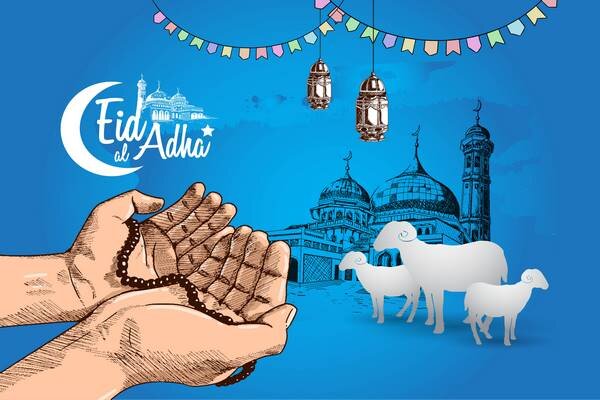
Muslims around the world begin celebrating the annual festival of Eid al-Adha – the Festival of Sacrifice – which falls on the 10th day of Dhul Hijjah, the 12th and last month of the Muslim lunar calendar.
Eid al-Adha is the second major Muslim festival after Eid al-Fitr, which marks the end of Ramadan, the month of fasting.
There are many other names for Eid al- Adha such as the big Eid as it is of 4 Days, while Eid A Fitr is only 3 days, the Sacrifice Day, the Pilgrims Day, etc…
The first day of Eid includes a prayer known as “Salat ul-Eid” which is a critical prayer to mark the beginning of the celebration. This prayer is usually held in open prayer yards called (Eid Mussala) on the morning of the first day of Eid prior to the sacrifice ceremony.
During Eid al-Adha, most Muslims attend the special prayers held at different major mosques and Islamic centers worldwide.
In Iran, the celebration begins with Muslims attending Eid prayers at local mosques and on unroofed grounds. Religious texts will be read all over the country.
Over the past years, congregational feast prayers have been carried out at Tehran University in the capital city. The venue is also used for other mass prayers in Tehran.
Families that can afford to sacrifice a ritually acceptable animal (sheep, goat, camel, or cow) do so and then divide the flesh equally among themselves, the poor, and friends and neighbors. Eid al-Adha is also a time for visiting with friends and family and for exchanging gifts.
On the occasion of Eid Al-Adha, the Leader of the Islamic Revolution Ayatollah Seyed Ali Khamenei agrees to pardon or commute the sentences of many convicted by the public and Revolutionary courts, the judicial organization of the Armed Forces as well as the courts related to government’s personnel.
Eid al-Adha is a public holiday in Muslim countries including Iran.
When asked about the origin of Eid al-Adha, Prophet Mohammad (PBUH), is reported to have said, “It is a tradition that has come down to us from Ibrahim (Abraham).”
The Feast of Sacrifice dates from the historic event when Prophet Ibrahim was commanded by God, in a form of a dream vision, to sacrifice his son, Ishmail. But while he was in the act of sacrificing his son, God sent the Angel Gabriel with a huge ram. Gabriel informed Ibrahim that his dream vision was fulfilled and instructed him to sacrifice the ram as a ransom for his son. The story is mentioned in Chapter #37 of the Holy Qur’an.
Eid al-Adha enjoys special significance because the Day of Sacrifice marks the climax of Hajj or Pilgrimage. This annual pilgrimage to Mecca and Medina in Saudi Arabia is an obligation only for those men and women who are physically and financially able to perform it once in their lifetime.
Eid al-Adha also marks the end of Hajj, a five-day pilgrimage all able-bodied and financially capable Muslims are obliged to undertake once in their lifetime. The pilgrimage is believed to cleanse the soul from sins and instill a sense of equality, sisterhood, and brotherhood.
Some 2.5 million pilgrims from around the world flock annually to the cities of Mecca and Medina in Saudi Arabia for the ritual.
During the Hajj the pilgrims perform acts of worship and renew their faith and sense of purpose in the world.
They stand before the Holy Kaaba in Mecca, a shrine built by Ibrahim, and praise Allah together.
Performing extra prayers in the morning is how most Muslims begin celebrating Eid.
The occasion is marked by the sacrifice of an animal that Muslims can eat – a goat, sheep, cow, or camel – by those who can afford to do so.
In many parts of the Muslim world, special livestock markets are set up for people to buy an animal for the Eid sacrifice.
The animal sacrifice comes with an element of charity, as the person paying for the sacrifice is required to distribute part of it to others.
The meat of the sacrificed animal is divided among three groups: the person sacrificing it and their immediate family, extended family and friends, and those in need.
Some Muslims will pay the value of an animal to one of a number of Muslim charities around the world that collect funds for remote animal sacrifices, distributing the meat to underprivileged groups – including refugees, the elderly, and disabled people.
“Eid al-Adha is the most sincere manifestation of worship, a symbol of sacrifice and surrenders in the face of God and a divine test day on which Prophet Ibrahim (AS) came out victorious, and his prayers were accepted and he was selected as an Imam and a role-model for believers,” late Iranian President Ebrahim Raeisi said in his message to his counterparts in the Islamic countries to congratulate Eid al-Adha on 2022.
The late Iranian president further wished that the Eid Adha brings the Muslims’ hearts closer to each other based on the Islamic teachings and “All the Muslims of the world take due steps in the path towards unity, empathy, and solidarity so that we can witness the increasing dignity and glory of the Islamic nation on all international levels.”
Reported by Amin Mohammadzadegan Khoyi
Republished